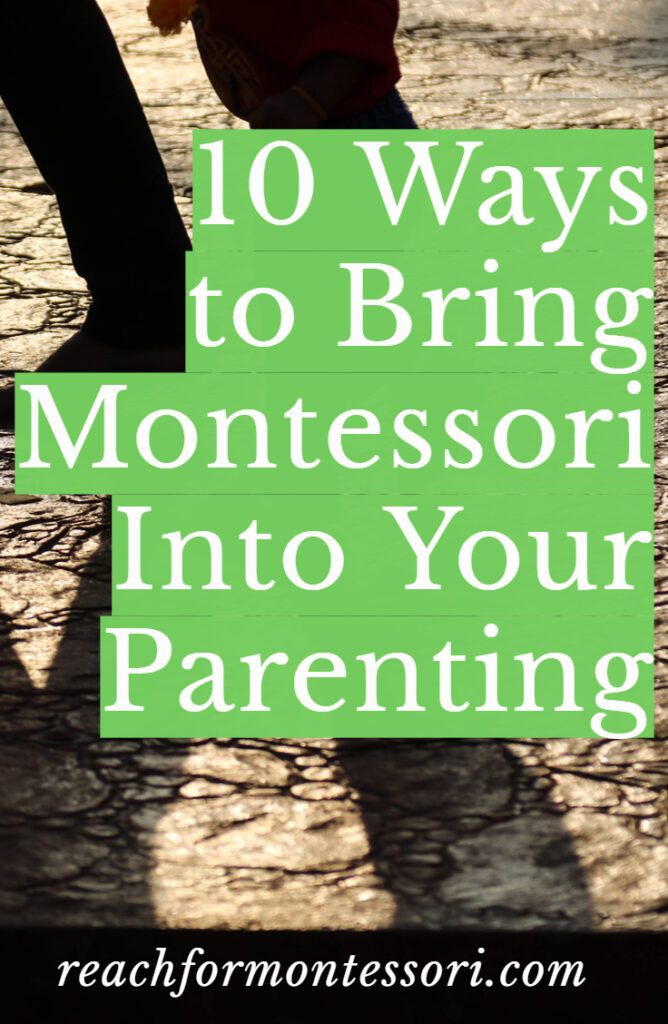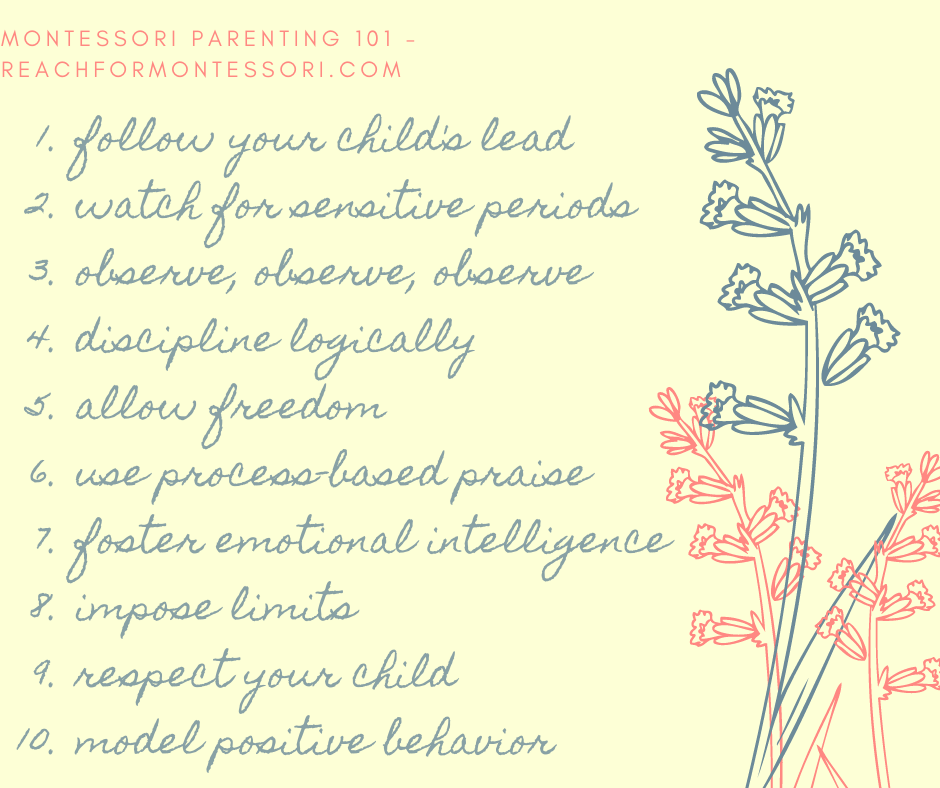Montessori is not just for the classroom anymore. It is absolutely possible to bring a Montessori parenting style into your home.
In this article, you will find out what Montessori parenting is and 10 ways you can incorporate Montessori into your parenting.
From respect to discipline, learn how you can spread the seeds of Montessori into the world by raising your child the Montessori way.
What is a Montessori parenting style?
Montessori parenting is a parenting style wherein parents give their child nurturing, comfort, and freedom, and maintain healthy limits and consistent, reasonable boundaries.
Montessori parents believe in Attachment Theory and allowing children the freedom to flourish on their own terms.
It is a common misconception that Montessori parents are permissive parents. Montessori parenting more closely aligns with authoritative parenting, however.
How to be a Montessori parent
You may have heard the argument of Montessori being simply an educational pedagogy vs Montessori being a way of life. It's true that your home will never operate as a Montessori classroom, nor should it.
There are many ways you can bring the Montessori philosophy into your home and apply it to your parenting, though. Here are 10 great ways to get you started with a Montessori parenting style.

1- Following your child's lead
“Follow the child” is a core Montessori tenet. If you are not familiar with this phrase, it essentially means to let your child show you what they need for their development, then provide opportunities for them to fulfill those developmental needs.
Following your child's lead can be tricky. With a properly prepared environment, though, it's much easier.
Keeping an open and inviting play space; clean and complete with accessible toys, “work” materials, books, and gross motor opportunities will help you get a good idea of what your child is interested in so you can follow their lead.
2- Keeping an eye out for sensitive periods
There are periods in your child's development wherein they are interested in acquiring a certain skill. These are called Sensitive Periods.
Dr. Montessori believed we should make efforts to accommodate and facilitate children's urges specific to these periods. Here are just a few sensitive periods to observe for:
For a full report on sensitive periods and where they fall as far as ages, click here.

3- Observe
In order to effectively follow your child's lead and watch out for sensitive periods in their development, observation is key.
In Montessori, observing is more than merely looking on. To properly observe your child, you need to watch their behaviors objectively.
Example:
You see that your child is placing their peg doll family in a basket and carrying them around the house, you might think that your child simply loves their peg doll family. And this may end up being a simple truth.
If you are really observant, though, you may notice that later in the day, your child places some of their stuffed animals in a cart and pushes them around the house.
Your child may be deep into the transporting schema. By taking an objective look at their behavior, you now have a better understanding of their behavior and you are able to follow up on some of their needs which you would have otherwise overlooked.
Are they counting the items they are transporting? Then they may be in a sensitive period for learning math, as well.
This is just an example, but it should give you an idea on what kind of information can be gathered from true observation.

4- Montessori parenting: Discipline
The word “discipline” can strike an ugly chord in those who parent gently. The word can give rise to the thought of various forms of punishment, as this is the common use of the word.
It's not a bad word, though. And it does not have to mean punishments.
In Montessori, we use the definition of discipline that relates to exercises with the end goal of self-control.
When implementing Montessori parenting, you should use a combination of natural and logical consequences. If you follow the link in the previous sentence, you will get a great explanation.
Briefly, though, here is an example of both natural and logical consequences:
Natural
- Your child throws their plate of food onto the floor. They have no food on their table and they feel upset that they are hungry. They learned that if they throw their food, they will not have it to eat.
Logical
- Your child throws their plate of food onto the floor. You invite them to gather supplies and clean the mess with you. They learned that food thrown on the floor must be cleaned up.
Both of these examples are perfectly gentle and Montessori-aligned ways of handling discipline in this situation.
Remember, the ultimate goal of discipline when implementing a Montessori parenting style is the development of self-discipline. Natural and logical consequences work toward this goal; punishments do not.

5- Take a step back
Our children's safety is always a primary concern, but staying too close, too often, can deprive them of really important learning experiences.
Allowing your child to take age-appropriate risks helps them develop better problem-solving skills and has been shown to have benefits to mental health well into adulthood.
Remember bullet point 4? Your child needs some space in order to experiment, take some healthy risks, and learn from their mistakes.
6- Use effective praise
You have likely heard that using the phrase “good job” may not be the best idea. Why is this, though?
The idea behind avoiding “good job” and similar forms of praise is that they focus on the product and not the process. Praising the end result of a child's work deprives them of chances to develop intrinsic motivation.
Example:
Your child builds a block tower. You say, “That's an amazing tower! You're so good at building!“
In this example, you praised the finished tower and you finished it off by delivering high expectations on their future work.
Alternative Example:
Your child builds a block tower. You say, “I saw you working so hard on that! You should be proud of yourself!“.
In this example, you praised their effort and the good feeling they got from working hard.
The difference between these 2 examples should give you a little to go on if you're looking to implement a Montessori way of raising your child. For a full, detailed article on effective praise, click here.

7- Teach emotional intelligence
Montessori is very exciting to many parents due to its academic approaches. Emotional intelligence is equally important and equally valued in Montessori, however.
This is one of the most important and easiest ways parents and caregivers can bring Montessori into their homes.
Here are some ways you can teach emotional intelligence:
- narrate feelings
- acknowledge and discuss feelings
- nurture empathy
- co-regulate and give strategies for self-regulation
Click here for full information on teaching emotional intelligence.
8- Allow freedom, while keeping limits
Setting consistent limits for your child helps them feel safe and secure, as it shows them that you are there to take control over a situation when it's needed. Children benefit from experiencing consistent and logical limits.
In Montessori, we allow as much freedom as possible, while ensuring children's safety and emotional wellbeing.
9- Respect your child
This is a tricky concept for many parents and caregivers. A lot of us grew up being told, “Children should be seen and not heard.“
This old type of thinking has come to light as being harmful, though. Know better, do better, as they say.
The respect of children is a Montessori tenet. What does respecting a child look like, though?
Here are some ways you can show your child respect:
- listen carefully to what they say and how they say it – value their words
- include them in daily activities and family conversations
- implement child-size furniture
- do not talk about them as if they cannot understand you/as if they are not in the room
- ask for their consent
- speak and touch them gently
- allow for natural consequences when possible – give them the room they need to learn
- show appreciation for the nice things they do
- don't rush them – walk at their pace, when possible
- accept them for who they are

10- Model the right behaviors
“Do as I say, not as I do” is something that simply should not be applied to parenting. This is because children are hardwired to imitate us.
Imitating adults is how children learn practical skills, social skills, and emotional coping techniques.
Do you want your child to take some deep breaths when they feel frustrated or overwhelmed? Take deep breaths when you are feeling those things.
Tell your child how you are feeling and what healthy coping mechanisms you are using to work through those feelings.
Apply this idea to your interactions with your child and other people, your interactions with your environment, etc., and you will be serving your child well.
As you can see, Montessori is not just for the classroom. If you apply these 10 points to your parenting, you will be well on your way to Montessori-style parenting.
Have you noticed a difference in your household after implementing a Montessori parenting style?
Cheers and don't forget to subscribe!
